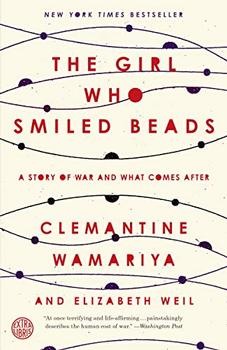Summary | Excerpt | Reviews | Beyond the Book | Readalikes | Genres & Themes | Author Bio

A Story of War and What Comes After
by Elizabeth Weil, Clemantine Wamariya
I'd fantasized about this moment so many times. In Malawi, I used to write my name in dust on trucks, hoping my mother would see my loopy cursive Clemantine and realize that I was alive. In Zaire, I'd saved coins so I could buy my parents presents. In Tanzania, I'd collected marbles for my older brother, Pudi, who wasn't there for this reunion. Pudi was dead.
Claire remained frozen. But I, in my TV clothes and blown-out hair, ran toward my Oprah-produced family, arms outstretched. I hugged my brother. I hugged my father. I hugged my tiny little sister. I hugged my mother, but my knees gave out and she had to pick me up. Then I hugged her. I hugged Claudette, my little sister, little no more. I walked across the stage and hugged Oprah. I hugged lovely, weathered Elie Wiesel.
The cameras were so far away that I forgot I was participating in a million-viewer spectacle, that my experience, my joy and pain, were being consumed by the masses, though I was aware enough to realize that everybody in the audience was crying.
A few hours later, though it seemed like minutes, we found ourselves on the sidewalk outside the studio, and my family took a black limo north to my sister's apartment. She lived in the front unit in a squat brick low-rise, across the street from the L tracks and a block away from an abandoned wooden house with a gable roof, a once fantastic, now forgotten home that I hoped would someday be ours. I would put everybody in it. We would be a family again.
Nobody talked in the car. In the apartment, nobody knew what to do, either. My mother, in her long blue dress, kept sitting down and standing up and touching everything—the living room walls, the TV remote—and singing about how God had protected us and now we must serve and love him. My father kept smiling, as though someone he mistrusted were taking pictures of him. Claire remained nearly catatonic: rocking, stone-faced. I thought she'd finally gone crazy, for real.
I sat on Claire's couch, looking at my strange new siblings, the ones who'd replaced me and Claire. They looked so perfect, their skin unblemished, their eyes alight, like an excellent fictional representation of a family that could have been mine. But they didn't know me and I didn't know them and the gap between us was a billion miles wide.
I fell asleep crying on Mariette's bed and woke still wearing my Oprah shoes.
The next day was Friday. Of course, I didn't go to school. We needed to start making up for so much lost time. Yet I couldn't look at my parents—they were ghosts.
I felt gratitude, yes. Oprah had brought my parents to me. But I also felt kicked in the stomach, as though my life were some psychologist's perverse experiment: Let's see how far we can take a person down, and then how far we can raise her up, and then let's see what happens!
Saturday, my family, along with the Thomases, drove up the lakeshore to the Chicago Botanic Garden, where we stared at the Illinois lilies and roses. We all wanted these to be beautiful links to the lilies and roses in Kigali, threads knitting this present to that past, but everything was awkward, and it felt as though cameras were still following us around. Sunday we did Navy Pier—the gaudy Ferris wheel, the sticky cotton candy, all the tourist stuff.
My father kept smiling his fake, pained smile. Mine probably looked the same: a smile covering a scream. Claire barely said a word. Then, Monday morning, my parents and new siblings left on the flight back to Rwanda that Oprah's people had booked for them, and Mrs. Thomas picked me up as usual at Claire's apartment. I had no idea how to make sense of what had just happened. So I just ran out to her Mercedes and she dropped me off at school.
Excerpted from The Girl Who Smiled Beads by Clemantine Wamariya and Elizabeth Weil. All rights reserved. No part of this excerpt may be reproduced or reprinted without permission in writing from the publisher.
Your guide toexceptional books
BookBrowse seeks out and recommends the best in contemporary fiction and nonfiction—books that not only engage and entertain but also deepen our understanding of ourselves and the world around us.